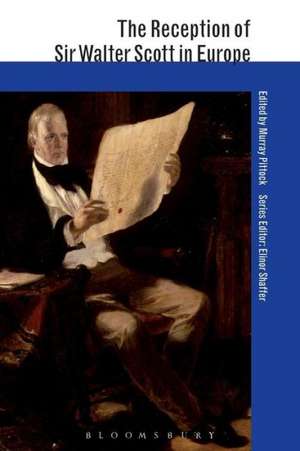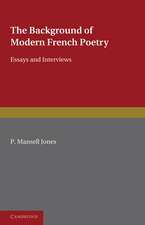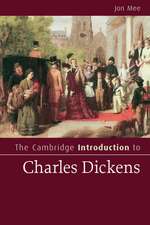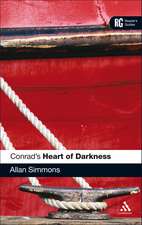The Reception of Sir Walter Scott in Europe: The Reception of British and Irish Authors in Europe
Editat de Professor Murray Pittocken Limba Engleză Paperback – 9 apr 2014
| Toate formatele și edițiile | Preț | Express |
|---|---|---|
| Paperback (1) | 230.90 lei 6-8 săpt. | |
| Bloomsbury Publishing – 9 apr 2014 | 230.90 lei 6-8 săpt. | |
| Hardback (1) | 1881.60 lei 6-8 săpt. | |
| Bloomsbury Publishing – 29 apr 2007 | 1881.60 lei 6-8 săpt. |
Din seria The Reception of British and Irish Authors in Europe
- 44%
 Preț: 2166.85 lei
Preț: 2166.85 lei - 36%
 Preț: 192.42 lei
Preț: 192.42 lei -
 Preț: 189.28 lei
Preț: 189.28 lei -
 Preț: 192.15 lei
Preț: 192.15 lei -
 Preț: 188.34 lei
Preț: 188.34 lei - 34%
 Preț: 229.75 lei
Preț: 229.75 lei -
 Preț: 193.96 lei
Preț: 193.96 lei -
 Preț: 398.19 lei
Preț: 398.19 lei -
 Preț: 192.99 lei
Preț: 192.99 lei -
 Preț: 190.44 lei
Preț: 190.44 lei -
 Preț: 586.90 lei
Preț: 586.90 lei -
 Preț: 190.81 lei
Preț: 190.81 lei - 36%
 Preț: 192.15 lei
Preț: 192.15 lei - 36%
 Preț: 192.42 lei
Preț: 192.42 lei - 44%
 Preț: 1667.84 lei
Preț: 1667.84 lei - 44%
 Preț: 1317.79 lei
Preț: 1317.79 lei - 44%
 Preț: 1317.79 lei
Preț: 1317.79 lei - 44%
 Preț: 1433.99 lei
Preț: 1433.99 lei - 35%
 Preț: 193.18 lei
Preț: 193.18 lei -
 Preț: 192.15 lei
Preț: 192.15 lei -
 Preț: 229.37 lei
Preț: 229.37 lei - 17%
 Preț: 329.44 lei
Preț: 329.44 lei -
 Preț: 1893.83 lei
Preț: 1893.83 lei -
 Preț: 1667.84 lei
Preț: 1667.84 lei - 14%
 Preț: 1471.24 lei
Preț: 1471.24 lei - 36%
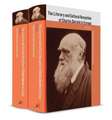 Preț: 1783.83 lei
Preț: 1783.83 lei
Preț: 230.90 lei
Preț vechi: 351.35 lei
-34% Nou
Puncte Express: 346
Preț estimativ în valută:
44.20€ • 46.12$ • 37.05£
44.20€ • 46.12$ • 37.05£
Carte tipărită la comandă
Livrare economică 13-27 martie
Preluare comenzi: 021 569.72.76
Specificații
ISBN-13: 9781472535474
ISBN-10: 1472535472
Pagini: 480
Dimensiuni: 156 x 234 x 25 mm
Greutate: 0.67 kg
Editura: Bloomsbury Publishing
Colecția Bloomsbury Academic
Seria The Reception of British and Irish Authors in Europe
Locul publicării:London, United Kingdom
ISBN-10: 1472535472
Pagini: 480
Dimensiuni: 156 x 234 x 25 mm
Greutate: 0.67 kg
Editura: Bloomsbury Publishing
Colecția Bloomsbury Academic
Seria The Reception of British and Irish Authors in Europe
Locul publicării:London, United Kingdom
Caracteristici
Scott - writer, poet, a born storyteller and master of dialogue - wrote 27 historical novels and was one of the greatest historical novelists
Notă biografică
Murray Pittock is Bradley Professor of English Literature at the University of Glasgow, a Fellow of the Royal Society of Edinburgh, and a prizewinner of that society and of the British Academy, as well as winning or being nominated or shortlisted for over ten other literary prizes. He is the author or editor of a number of prominent works on Jacobitism and Romanticism, including Scottish and Irish Romanticism (2008, 2011), Robert Burns in Global Culture (2011) and Material Culture and Sedition: Treacherous, Objects, Secret Places (2013). He is currently editing the Scots Musical Museum in the AHRC Collected Burns edition.
Cuprins
Series Editor's Preface Acknowledgements List of Contributors Abbreviations Timeline: European Reception of Walter Scott; Paul Barnaby Introduction: Scott and the European Nationalities Question; Murray Pittock 1. Scott in France; Richard Maxwell 2. Scott and Defauconpret: A New Model of Translation; Paul Barnaby 3. The Reception of Sir Walter Scott in Spain; José Enrique Garcia-González and Fernado Toda 4. Ivanhoe, a Tale of the Crusades, or, Scott in Catalonia; Andrew Monnickendam 5. The Reception of Walter Scott in Nineteenth-Century Austria; Norbert Bachleitner 6. The Reception of Walter Scott in German Literary Histories, c1820-c1945; Frauke Reitemeier7. The Reception of Walter Scott in East, West and Reunified Germany, (1949-2005); Annika Bautz 8. The Hungarian Reception of Walter Scott in the Nineteenth Century; Emilia Szaffner 9. The Canonization of Walter Scott as the Inventor of the Historical Novel in Twentieth-Century Hungarian Reception; Gertrud Szamosi 10. From Romantic Folklorism to Children's Adventure Fiction: Walter Scott in Czech Culture; Martin Procházka 11. The Polish Reception of Sir Walter Scott; Mirka Modrzewska 12. The Rise and Fall of Walter Scott's Popularity in Russia; Mark Altshuller 13. Walter Scott and the Idea of History in Russia; Tatiana Artemyeva with Mikael Mikeshin14. Slovene Reception of Sir Walter Scott in the Nineteenth Century; Tone Smolej 15. 'His pirates had foray'd on Scottish hill': The Danish Reception of Scott with an Outline of his Reception in Norway and Sweden; Jørgen Erik Nielsen 16. European Reception of Scott's Poetry: Translation as the Front Line; Tom Hubbard 17. Scott's 'Heyday' in Opera; Jeremy Tambling 18. 'Seeing with the Painter's Eye': Sir Walter Scott's Challenge to Nineteenth-Century Art; Beth Wright 19. 'Scotland is Scott-Land'; Scott and the Development of Tourism; Alastair Durie BibliographyIndex
Recenzii
Title mention in the New Humanist, 2007
"...Specialists in the history of the novel or 19th-century fiction will want this book. Summing Up: Recommended. Graduate students and researchers." -M. E. Burnstein, CHOICE, April 2008, Vol. 45, No.
Of the series:"...anyone who has read the Reception volumes will be aware of the rigorous interrogation of issues of nationality, Europeanism and literary cosmopolitanism that have added in such valuable ways to our understanding of a range of British writers within a wider international context." - Byron Journal
"...a fascinating and compelling book...a fine volume. Scott scholars, readers interested in reception studies, the history of the book or literature in translation should find it compulsive reading." - Byron Journal
"A valuable resource for Scott scholars - and for students of European culture in the last two centries" - Translation and Literature
'The Reception of Sir Walter Scott in Europe, edited by Murray Pittock, is a collection of essays by able people. One of them, Paul Barnaby, has provided a "timeline of the European reception" of Scott's works, based on the dates of early translations. The Germans were first to take him up, in 1810, with poems from Minstrelsy of the Scottish Border, followed by Lady of the Lake five years later. In the meantime, there was poetry in Portuguese and French, but once Scott began to write fiction the translations came rapidly...'- Times Literary Supplement, August 2007
"...Specialists in the history of the novel or 19th-century fiction will want this book. Summing Up: Recommended. Graduate students and researchers." -M. E. Burnstein, CHOICE, April 2008, Vol. 45, No.
Of the series:"...anyone who has read the Reception volumes will be aware of the rigorous interrogation of issues of nationality, Europeanism and literary cosmopolitanism that have added in such valuable ways to our understanding of a range of British writers within a wider international context." - Byron Journal
"...a fascinating and compelling book...a fine volume. Scott scholars, readers interested in reception studies, the history of the book or literature in translation should find it compulsive reading." - Byron Journal
"A valuable resource for Scott scholars - and for students of European culture in the last two centries" - Translation and Literature
'The Reception of Sir Walter Scott in Europe, edited by Murray Pittock, is a collection of essays by able people. One of them, Paul Barnaby, has provided a "timeline of the European reception" of Scott's works, based on the dates of early translations. The Germans were first to take him up, in 1810, with poems from Minstrelsy of the Scottish Border, followed by Lady of the Lake five years later. In the meantime, there was poetry in Portuguese and French, but once Scott began to write fiction the translations came rapidly...'- Times Literary Supplement, August 2007
